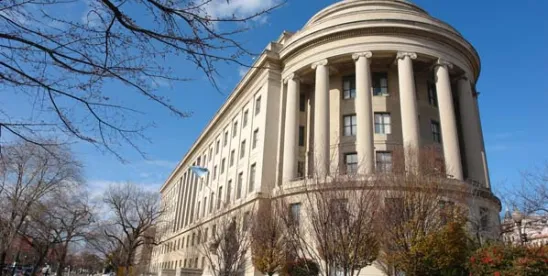What Happened: On April 23, 2024, the FTC announced its final rule (Final Rule) banning non-competes. Passed in a 3 to 2 vote along party lines, the Final Rule formalizes the proposed rule issued in January 2023. With a broad sweeping prohibition on future and most existing non-competes, the Final Rule could present significant legal hurdles for companies should the Final Rule go into effect.
The Bottom Line: Businesses should take stock of their existing non-competes to determine if they will remain enforceable should the Final Rule go into effect, and should consider alternative ways to protect business interests.
The Full Story: The Final Rule is based in Section 5 of the FTC Act and creates a categorical ban on non-competes with limited exceptions. The Final Rule defines a “non-compete” as “any term or condition of employment that prohibits a worker from, penalizes a worker for, or functions to prevent a worker from” seeking or accepting employment or operating a business in the United States after the current employment ends. Section 5 of the FTC Act applies broadly to most employers.[1]
The Final Rule will go into effect 120 days after the Final Rule is published in the Federal Register. Once in effect, all current and former employees, except for “senior executives” (Senior Executives), with existing non-compete agreements must be notified that their non-competes are no longer enforceable. While existing non-competes need not be legally modified, as suggested by the proposed rule, employers still must formally notify employees with existing non-competes of their discontinued use. The Final Rule provides a model notice that can be sent via mass communication to current and former employees and does not require identifying the recipient as having a noncompete. Once the Final Rule is effective, employers are prohibited from entering into or attempting to enter into new post-employment non-competes with any worker–including Senior Executives.
The Final Rule carves out an exception for Senior Executives, defined as those earning more than $151,164 and in a “policy-making position.” The Final Rule states that “policy-making position” means a president, CEO or the equivalent or any other officer of a business entity who has policy-making authority, defined as final authority to make policy decisions that control significant aspects of a business entity or common enterprise. It does not include having final authority to make policy decisions for only a subsidiary of or an affiliate of a common enterprise. The vagueness of the definition of Senior Executive seems ripe to be an issue for litigation given the final rulemaking estimates that less than 1% of all workers are likely to be considered Senior Executives.
While the Final Rule moved away from the original proposed rule to prohibit restrictions that may be considered “de facto” noncompete restrictions based on vagueness concerns, the Final Rule still bans agreements that are “functional equivalents of non-competes.” Thus any term or condition that “prohibits a worker from, penalizes a worker for, or functions to prevent a worker from” seeking or accepting employment elsewhere may be deemed illegal. Certain types of agreements that include a requirement to pay liquidated damages if an employee works for a competitor, forfeiture-for-competition clauses or severance arrangements contingent on the worker refraining from competing are given as examples of functional equivalents of non-competes. Further, while NDAs, training repayment provisions (TRAPs) and non-solicitation agreements are not categorically banned, they could be deemed as functional equivalents to a noncompete if they are overly broad or so onerous that they have the same functional effect as a noncompete. Further, the Final Rule clarified that a “garden leave” provision (where an employee is still receiving the same compensation while continuing to be employed) is not viewed as a non-compete.
The sale of a business exception from the proposed rule remains in the Final Rule and our full discussion is addressed in another Client Alert by the firm. Also, the Final Rule clarifies that a “worker” does not include a franchisee in a franchisor-franchisee arrangement, but does apply to employees of a franchisor or franchisee.
As of now, two notable legal challenges to the FTC’s Final Rule have been made: Ryan LLC v. Federal Trade Commission, 3:24-cv-986 (N.D. Tex., Apr. 23, 2024) and Chamber of Commerce of the United States of America et al. v. Federal Trade Commission, 6:24-cv-00148 (E.D. Tex., Apr. 24, 2024). The Chamber of Commerce brings multiple challenges to the Final Rule under the Administrative Procedure Act. Of note, the Chamber of Commerce argues that the FTC has exceeded its statutory authority under the “major questions doctrine.” The major question doctrine prohibits agency attempts to promulgate new rules which have broad sweeping economic and political significance unless the agency has been given clear congressional authority. The Chamber of Commerce argues that the Final Rule’s vast and long-lasting impact necessitates clear congressional authority, which the FTC does not have.
The Chamber of Commerce has filed a motion for preliminary injunction and a motion to stay of effective dates. It is possible that the Final Rule’s effective date will be stayed pending resolution of the litigation, likely to go to the Supreme Court.
Even if the Final Rule is struck down, it should be noted that the FTC has already challenged employee non-competes as Section 5 violations last year when it first announced the proposed rule banning non-competes. Moreover, certain state attorneys general have also pursued enforcement action against employee non-competes. If the FTC’s Final Rule becomes effective, it will supersede state law only to the extent the state law would permit or authorize restrictions banned by the Final Rule. Notwithstanding the FTC’s Final Rule, several states already prohibit or limit the use of non-competes, and other states have pending legislation that would ban or limit the use of non-competes, as well.
While there are questions as to whether and if the Final Rule will become effective, employers can take some measures now including:
- determine whether their business is subject to Section 5 of the FTC Act. If the business is a non-profit or other tax-exempt business, ensure that the business complies with the applicable standards to claim tax-exempt status;
- conduct an audit of all existing non-competes (for current and former employees);
- determine which employees may be considered Senior Executives versus those who are subject to the categorical ban on non-competes;
- review existing employee policies or handbooks that include or reference non-competes;
- review other current restrictions such as NDAs, customer and/or employee non-solicitation agreements;
- determine whether other types of restrictions might be sufficient to protect the company’s business interests should the Final Rule become effective and the use of non-competes becomes unavailable; and
- begin to consider other ways to retain workers such as retention bonuses or deferred compensation.
[1] While Section 5 does not apply to non-profit employers, the FTC has indicated that merely claiming tax-exempt, non-profit status may be insufficient. The FTC notes it reserves the right to evaluate an entity’s non-profit status to see if it may actually be subject to the new prohibition on non-competes. Section 5 also does not apply to banks, savings and loan companies, transportation and communications common carriers, air carriers and entities subject to the Packers and Stockyards Act of 1921.






 />i
/>i
